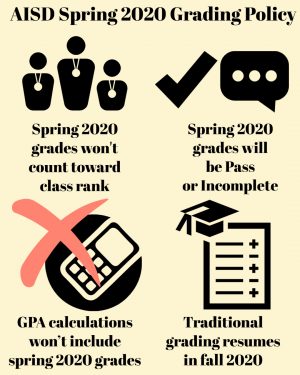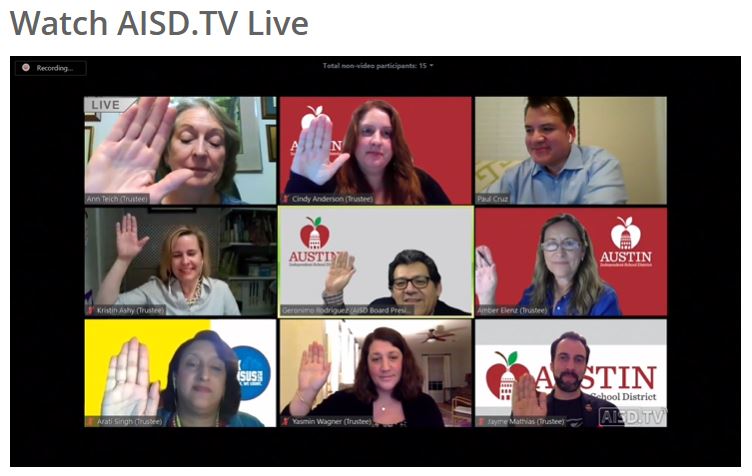District approves new grading policy, emergency procedure options in response to COVID-19
In effort to find equitable solutions to campus closures, Trustees pass three resolutions at emergency meeting
The board votes to adjourn a meeting that lasted nearly four hours and included a long period of questioning from each board member and four public comments that were recorded and played during the video conference instead of being delivered in person. The meeting ended at 12:05 a.m. Screen shot of AISD.TV feed of board meeting, which was broadcast on the AISD website.
April 7, 2020
Monday night’s virtual Board meeting began with a moment of silence for Patricia Hernandez, a food service employee and a “much-loved” community member at Casis Elementary, who passed away on April 2. She had tested positive for COVID-19.
Although it cannot be determined that the virus was the cause of her death, the moment of silence put the rest of the meeting into perspective: the insidious coronavirus isn’t just changing the way school, report cards, and social lives look, but is more consequentially altering our communities in the worst way.

According to the resolution passed late Monday night, spring semester grades will be PASS or INCOMPLETE and will not affect class rank for seniors or grade point averages for juniors, sophomores or freshmen. Graphic by Dave Winter.
In addressing the implications of the spread of the virus, Superintendent Paul Cruz said that the district is committed to providing nutritious meals to students and their families, sharing mental health resources, and ensuring teacher and staff compensation. In discussing the changes that come with school moving to online format, the trustees’s main focus was on ensuring the mental health of students, assuring that emotional health must come first if learning is to follow. Their main challenge was to find a solution to the shift that was equitable for all students, a goal that informed their resolutions to change the grading policy, and to ensure all students were provided the resources to continue learning, remotely.
With campuses closed and lessons transitioned to online formats, the next component of school to be altered by COVID-19 was the grading system. Via a Zoom video conference call, the Board of Trustees ultimately decided to pass a resolution that specified changes in the graduation requirements and grading policy for the school year made necessary by the societal impact of the coronavirus.
Under the resolutions, the trustees voted that grades from the second semester of school will not be counted towards class rank for seniors or grade point averages for juniors, sophomores and freshmen. Instead, GPA and class rankings for the 2019-2020 school year will be solely determined by grades from the fall semester. The rest of the school year, moreover, will carry on without numerical grades, and instead, students will receive either a pass or an incomplete for their courses.
“The social and emotional needs [of students] are so different today than they were in the fall semester,” Superintendent Dr. Paul Cruz said at the board meeting. “There are so many situations that even our teachers are dealing with: they’re working at home and being parents and a full-time teacher at the same time. We couldn’t account for that second semester because we couldn’t account for every student having the same resources and opportunities. Because we couldn’t account for it and provide every single student with that type of opportunity, we didn’t think we could use that in GPA or [class rank].”
In a podcast interview with The Shield on Tuesday, Principal Brandi Hosack clarified that an “incomplete” on a transcript does not equate to a failing grade in a class, just that that student hasn’t yet earned their course credit.
“What’s to remain from here on out, it’s not going to be a pass/ fail grading system,” Hosack said. “The expectation is that you still engage with your teachers, with your classes, that you still continue to progress. What you won’t see here on out is a number grade. You will get feedback from your teachers on how you’re doing, on how you’re progressing, and at the end, what will be on a transcript is a pass or an incomplete.”
If a student gets an incomplete for a class, that means that it is up to them to work with their teachers to complete the course and earn a “pass” grade and secure their credit.
Although spring-semester grades will be recorded on transcripts as pass or incomplete, the numerical grades already earned by students from the beginning of the spring semester up until spring break won’t disappear completely. While the nine weeks of work from the second semester before school was closed will not go towards GPA and class ranks, these grades will go towards yearlong averages for every student. The yearlong average will determine whether a student will pass their class. Hosack hopes that the yearlong averages will help students who failed classes in the first semester but achieved higher grades in the second semester by bumping up the grade when they are averaged together.
“ [If] a student doesn’t pass the first semester, but passes the second semester with enough room, [they] can average those grades together for what we call a yearlong average. That will be available for students to use, so the first semester … and the nine-week period of the spring semester, those two grading periods will be averaged together for a yearlong average.”
Hosack reassures students worried about their averages being too low to pass a class that they will be able to work with their teachers to correct grades from the fourth six-weeks of school, as well as grades from the first semester, in order to raise yearlong averages further.
“Students have the ability to go back and improve their grades for the first nine weeks of this semester. They also have the ability to go back, and if they did not pass the class in the first semester, they can go back and do some work with their teacher to try to improve that grade,” Hosack said.
Post-March 12 grades from AP classes will also follow the pass/incomplete system, as these grades are controlled by teachers (not the College Board) and therefore fall under district control.
ACC dual credit classes and OnRamps classes, however, aren’t influenced by the district’s changes, and those grading systems are controled by the colleges that offer those classes. Both ACC and UT have offered their students the opportunity to switch to pass/fail grading as they transition online, but right now, Hosack says it is not yet clear if this offer will apply to McCallum students taking those courses, or if their grades will continue being recorded normally.
In creating these resolutions, the district worked closely with educators inside AISD, as well as taking cues from ACC and UT on how to adapt grading policy. Dr Elizabeth Goodnow, the associate superintendent of academics and social and emotional learning, said that as the impact of COVID-19’s influence on schools and colleges is so widespread, these changes are happening in similar effect across the nation.
“We have spent not just a lot of time with campus staff, including academic deans, [and] principals from all three grade levels, [but] also talking very closely with our partners at Austin Community College and University of Texas at Austin [in] aligning all of these different institutions that we work with,” Goodnow said at Monday’s board meeting . “In any institution where a GPA matters, they are taking this unprecedented event into their policy, so this really does become consistent to what we’re seeing across the nation.”
These changes are going to be in effect until the end of the semester, with normal grading policy set to resume in the 2020-2021 school year. The district claims to be focusing effort on being as equitable as possible, considering the challenges that come with online school, like unequal access to internet, technology, and some students struggling to balance their school work with the responsibility of caring for family or working an essential job during this time.
The board also approved resolutions that would allow them to continue to pay employees during the extended school closures, and to give the superintendent power to make emergency “Procurements,” as stated in the resolution, as needed to ensure that AISD can continue to provide resources like online learning, free meals, learning sites and other services to ease the impact of COVID-19.
In addition to this measure, a resolution was passed to give the superintendent or another delegate the authority to negotiate funds “through the district’s 2017 Bond Construction Projects.” They also passed a resolution waiving TEC appraisals of teachers and administrators, which were in progress when school was interrupted and then moved online.
In a resolution unrelated to COVID-19, the board approved the search firm J.J. Consulting to help coordinate the search for a new superintendent to replace Cruz who announced in February that he was stepping down from his post to join the UT faculty.
For now, the district’s biggest priority seems to be helping elementary and middle schoolers transition to online by making sure they have the technological resources to do so. As challenging as the transition has been for high school, Hosack admits that an equitable transition for younger grade levels has been much more complicated.
“I think high school students were sitting in the best position as far as students in the district go, because our elementary school and middle school students didn’t even have devices,” Hosack said.
The district has issued Chromebooks to high school students since January 2018.
While the district focuses on making sure that younger students have devices for online work, the McCallum community is still working hard to make sure all Knights have the supplies they need to be successful.
“Our main focus as McCallum administrators is to take care of you guys,” Hosack said. “What we’re trying to do with this grading policy is to hold students harmless in not being able to access curriculum in the same way other students may be able to. We are working hard to make sure everyone has a working Chromebook, everyone has Wi-Fi access. We are going to make sure we finish the year off, maybe not as we would have all hoped, but we’re going to finish it together, and we will get through it.”








